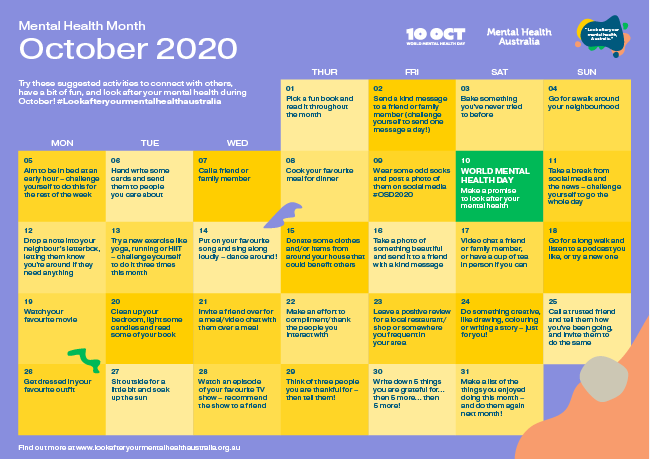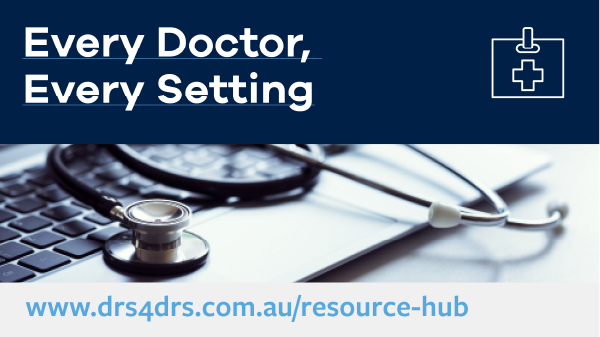How is your Mental Health Month going?

October is clearly a busy month for our mental health ecosystem, especially those advocating for reform and change. Throw in a Federal Budget and the intensity and need for advocacy only goes up a level or five.
So in a week that started with SANE releasing their world leading National Stigma Report Card and included a range of activities for National Carers Week led by our good friends at Carers Australia, the spotlight on the mental health system and those who provide unpaid care within it only increased in intensity.
I have always thought that having National Carers Week alongside Mental Health Week is the right timing. The impact of caring for a loved one places people at a higher risk of developing their own mental health concerns. As a mum watching from afar as my adult kids and their families traverse the second Melbourne lock-down, I can understand the worry and a sense of helplessness.
Closer to home at Mental Health Australia we were pleased to be able to deliver a detailed analysis of the 2020 Federal Budget to Members on Wednesday.
This Budget Analysis gauges the value of this Budget in relation to mental health and related investments. It is a difficult task as the transparency of the Budget papers has diminished over time making it harder to ascertain new investments from existing commitments. This is exacerbated in a year when the Budget is tabled six months later than usual due to unprecedented expenditure to address the impact the COVID-19 pandemic.
Nonetheless there are some standout issues. The Government’s overall response to the pandemic has been widely supported and, in relation to the focus and expenditure on mental health, world leading. It offered hope through funding increases to mental health and wellbeing support services and financial support to many (but not all) including the most vulnerable through the JobKeeper and JobSeeker investments.
While the 2020 Budget includes modest additional mental health funding by doubling the sessions available under the Better Access initiative, it fails to build in evaluation or requirements for data collection that would demonstrate value for money in this important program. It also goes backward in its support of the most vulnerable through reductions in JobSeeker payment (Coronavirus Supplement), failure to better support women and people facing housing instability and a lack of commitment of ongoing funding for people with a psychosocial disability who are not eligible for the NDIS.
This leaves the mental health sector at a crossroads.
The global pandemic has sorely tested the resilience of all Australians but on the other hand it has also offered opportunities to innovate the way services are delivered. At the same time, Australia’s mental health system has been put under the microscope through the Productivity Commission’s Inquiry into mental health with the final report yet to be publicly released by Government.
In a year that started with the devastation of bushfires and responses underpinned by the principle of ‘building back better’, it seems this Budget has missed the opportunity to highlight and expand innovative practices developed during the pandemic. In addition, although there are some investments made across the social determinants of mental health, there are omissions in areas such as housing and financial security, both of which are directly related to mental health and wellbeing.
In other words, while there has been welcomed investment to meet some of the additional demand created by these extraordinary times, Budget 2020 still leaves Australia’s mental health system treading water and does not take us forward. We can only hope that the next big forward step will come when the Productivity Commission’s final report is released and recommendations turn into reform.
And hopefully that will be in the coming weeks.
You can download our detailed Budget Analysis document here.
Have a good weekend.

Leanne Beagley
CEO
Save the date!
This year our Mental Health Australia Annual General Meeting will be held on-line at 2.30pm on December 12th, 2020. Following that meeting and starting at 3pm, we are delighted that Professor Brendan Murphy has agreed to be our guest speaker. He was the Chief Medical Officer when the pandemic hit Australia and guided us through the challenges of the national pandemic response. He is now the Secretary of the Commonwealth Department of Health and will provide us with his reflections on 2020 and the challenges ahead, particularly for the mental health ecosystem. Please save the date in your diary and details on how to register will be sent to members and stakeholders directly.
On Tuesday Melanie Cantwell and I had the opportunity to meet with Prof Murphy and his senior team, where we were able to brief him on the work of Mental Health Australia but more importantly discuss a range of matters of concern to the sector including the recent budget announcements, the important interface for mental health care with the health, disability, justice, housing and social services sectors - and the pending Productivity Commission Final Report.
Mental Health Australia is enhancing the way we engage with members
Mental Health Australia develops papers and submissions to advocate for mental health reforms to improve the lives of all Australians with mental illness informed by key mental health sector experts, consumers and carers and other stakeholders. These papers and submissions provide the platform on which Mental Health Australia undertakes systemic advocacy.
To engage with the sector to develop these policy positions, Mental Health Australia has historically held two face to face Member Policy Forums per year. While these are well attended events the expectation of member organisations and governments is shifting in response to rapidly changing political environment that is heavily influenced by a 24 hour news cycle and social media. Further, the impact of the pandemic has shown us that we can meet and work remotely but remain connected, informed and effective. To respond to this new environment Mental Health Australia is changing the way it works with members.
Member Policy Forums will continue to be arranged either as face to face (as undertaken pre-pandemic) or online as has occurred during the second half of 2020, or both. These will target medium to longer term reform issues consistent with the Charter and Strategic Planning.
In addition Mental Health Australia will now also offer its members Member Briefings and Member Policy Hubs:
- Member Briefings will be exclusively for members and will provide direct information on what’s happening at a national level from an MHA perspective. These will be formatted as webinars and linked closely to the CEO Updates but targeted for Members only.
- Member Policy Hubs will be short term “sprint teams” drawn together from the membership to address key current policy issues. The objective of the Policy Hub format is to supplement the existing face to face Members Policy Forums to provide an opportunity to better engage member organisations and consumers and carers and utilise research evidence in a timely and more responsive way to inform the work of Mental Health Australia.
We are excited to get these new types of engagement up and running, with the first Member Policy Hub due to kick off in the first week of November on the topic of NDIS Independent Assessments. Members have already received information about this via email.
We look forward to enriching our engagement with members over the coming months through these new methods and will be keen to understand how we can continue to improve member engagement as we go forward.
Joint submission: Inquiry into National Commissioner for Defence and Veteran Suicide Prevention legislation
Last week Mental Health Australia and Suicide Prevention Australia provided a second joint submission regarding the establishment of a National Commissioner for Defence and Veteran Suicide Prevention. In this submission to a senate inquiry, we strongly supported the objectives of the legislation, and outlined a number of ways in which it could be strengthened in relation to: data collection, supporting a whole-of-life wellbeing approach, focusing on transition from the defence force to civilian life as a particularly vulnerable time, connecting people who are bereaved with postvention support and supporting a whole of government approach.
Read the submission
|
On Monday I have my regular meeting with Dr Ruth Vine, Deputy Chief Medical Officer and am also looking forward to catching up with Nicky Bath from National LGBTI Health Alliance.
On Tuesday we are meeting with the RACGP and Consumers Health Forum to progress out shared work on Social Prescribing and then in the evening I will be attending the GP Annual Awards night and will be part of a panel discussion with Dr Mukesh Haikerwal and Dr Caroline Jones.
On Thursday I will be attending the National Peak Bodies Bushfire Recovery Coordination Meeting and later meeting with the Mental Health Commissioners across Australia.
On Friday I have the Primary Health Reform Steering Group meeting and then a meeting with the National Mental Health Workforce Strategy Taskforce.
|
|
Embrace Multicultural Mental Health News
|
The Framework for Mental Health in Multicultural Australia (the Framework) is a free, nationally available online resource which allows organisations and individual practitioners to evaluate and enhance their cultural responsiveness. It has been mapped against national standards to help you meet your existing requirements, with access to a wide range of support and resources.

|
Mental Health Services in Australia
Mental health services in Australia describes the activity and characteristics of Australia’s health care and social care services accessed by people with a mental illness. This web report provides the most recent data available on the national response of the health and welfare system to the mental health care needs of Australians. Data are progressively published as it becomes available throughout the year.
Read more
Students with disabilities face increasing barriers to education, Royal Commission told
An RMIT expert has outlined the major barriers facing students with disability to accessing a quality education and called for an end to suspension and exclusion as a form of behaviour management. International expert on behaviour, disability and mental health in education, Dr David Armstrong, was speaking at the Disability Royal Commission hearing into ‘Barriers to accessing a safe, quality and inclusive school education and life course impacts’.
Read more
Grief and trauma support for Australia’s aged care sector
The Australian Government is investing $12.4 million in a Grief and Trauma Response Package to ensure support is available for those affected by COVID-19 across the aged care sector. This is part of the $171.5 million COVID-19 response plan for aged care support programs announced in August 2020.
Read more
Caring for mental and physical health during the pandemic
Minister for Health, Greg Hunt, says the Morrison Government recognises it is a very challenging time for many Australians, with the effects of the COVID-19 pandemic on daily life and work having taken a considerable toll on the mental health of individuals and communities.
Read more
Accredited mental health social workers respond to growing demand for mental health support
Mental health is one of the most neglected areas of public health and AASW National President Ms Christine Craik has cautioned that the consequences of the COVID-19 on people’s mental well being we are already seeing, is just the beginning.
Read more
Research shows pandemic’s toll on arts and creative sector workers’ mental health
Experts from RMIT University are available to talk about the impact of Victoria’s COVID-19 restrictions on arts workers, including creative and technical workers and the implications for their mental health. Researchers are studying the impact of the arts shutdown on workers’ emotional and mental health.
Read more
Australians businesses unite to tackle mental health in the workplace
Minister for Health, Greg Hunt, this week joined leaders from some of Australia’s largest employers to launch the Corporate Mental Health Alliance Australia (CMHAA), a new business-led, expert-guided member organisation dedicated to improving mental health in the workplace. The Alliance’s 15 founding members - many of them direct competitors - recognise that the mental wellbeing of their employees transcends market dynamics, and that working together will give them the best chance of delivering real impact for their people. These members and participants include AIA Australia, Allianz Australia, Bunnings Group, Clayton Utz, Coles Group, Commonwealth Bank, Deloitte, DLA Piper, Johnson & Johnson Family of Companies, King & Wood Mallesons, KPMG, Microsoft Australia, MinterEllison, Woolworths Group and PwC Australia.
Read more
Investment in workforce capability for veterans’ mental health applauded
The Royal Australian and New Zealand College of Psychiatrists (RANZCP) has welcomed new Budget initiatives to strengthen the capacity of the healthcare workforce to provide more timely, seamless and high quality services to veterans and their families.
Read more
|
|
|
|

TheMHS Learning Network Inc
TheMHS Learning Network Inc. is an international learning network for improving mental health services in Australia and New Zealand. TheMHS Learning Network is a registered charity run by a volunteer Management Committee. TheMHS events bring together people from across Australia and New Zealand to stimulate debates that challenge the boundaries of present knowledge and ideas about mental health care and mental health systems. TheMHS Learning Network believes in promoting positive attitudes about mental health and mental illness. Their forums foster the exchange of ideas, focus discussion on workforce development, and are a great place for networking and debate for professionals, consumers, families and carers, managers, researchers and policy-makers.

Exercise & Sports Science Australia (ESSA)
Founded in 1991 Exercise & Sports Science Australia (ESSA), formerly known as the Australian Association for Exercise and Sports Science (AAESS), is a professional organisation which is committed to establishing, promoting and defending the career paths of tertiary trained exercise and sports science practitioners. Vision - To enhance performance, health and well-being through the science of exercise and sport. Mission - Lead and promote the excellence in exercise and sports science for the benefits of society and the professions.
|
|
Launch of Every Doctor, Every Setting: A National Framework
The time is now to support the mental health and wellbeing of Australian doctors and medical students. A mentally healthy doctor or medical student is a key enabler of quality patient care.
Show your support for the launch and adoption of the Every Doctor, Every Setting: A National Framework by reading, signing and sharing how you will put the framework in to practice as an individual, organisation or service.
Read more
Australian Scholarships Foundation - Australian Institute of Company Directors
The 2020/21 AICD National Not-for-Profit Scholarship Program will make 130 full scholarships available to the Australian not-for-profit sector, with the aim of enabling directors, senior managers and emerging directors of NFP organisations (with a turnover of less than $2m) to attend the AICD’s Governance Foundations for Not-for-Profit Directors program.
Read more
SuperFriend’s Indicators of a Thriving Workplace Report 2020
This latest Report from Australia’s largest workplace mental health study features unique insights from COVID-19’s profound impact on workers around the nation.
Learn which industries are most and least thriving, as measured against 40 scientifically-validated indicators through responses from more than 10,000 Australian workers.
The Report also highlights at-risk industries and populations, actions most likely to improve worker outcomes, and practical strategies for getting the best out of your people.
Read more
Child Family Community Australia (CFCA) webinar
Working Together to Prevent Youth Suicide: The Power of Communication
28 October 2020, 1.00pm-2.00pm
Online
Cost: Free.
Research shows that young Australians aged 12–25 years are at the greatest risk of being harmed by suicide. This may be through their own suicidal thoughts or behaviours, or through those of someone close to them. Professionals working across education, health and social services play an important role in helping to prevent suicide, where possible, and addressing the community harm that it produces.
This webinar will explore local, place-based approaches to the prevention of suicide among young people and the minimisation of community harm following a suicide, known as ‘postvention’.
Drawing on both research evidence and the lived experience of a youth peer support worker, it will:
- describe current understandings of suicide prevention and postvention
- identify key risk factors for young people, including the impacts of COVID-19
- explore local, place-based strategies for suicide prevention and postvention, including one community’s use of #chatsafe guidelines to equip young people with the tools to support themselves and each other.
Read more
Webinar: LGBTIQ+ people, mental health and the NDIS
Join us for this FREE Webinar, Thursday 5th November 2020, 3pm – 4pm AEDT
People in LGBTIQ+ communities have an increased risk of developing a mental health condition and are less likely to access services due to discrimination and marginalisation. LGBTIQ+ people have the right to respectful and non-judgemental service provision.
Join MHCC & guest speakers:
- Charlie Willbridge - National LGBTI Health Alliance
- Amelia Arnold - Thorne Harbour Health
Read more
SANE’s National Stigma Report Card
The National Stigma Report Card and Our Turn to Speak survey focus on understanding the impact of stigma and discrimination on people living with complex mental health issues, across a broad range of life domains. For many people, these experiences have a profound, sustained and negative impact. This report presents rich data on these themes, which some people may find confronting.
Read more
|
|
|
|

|
|
|









